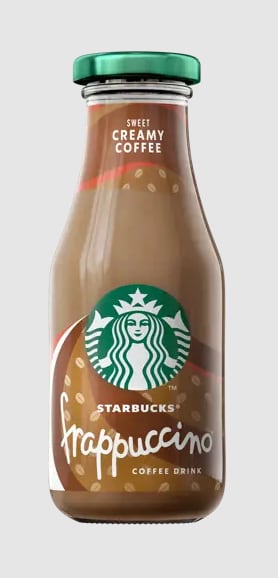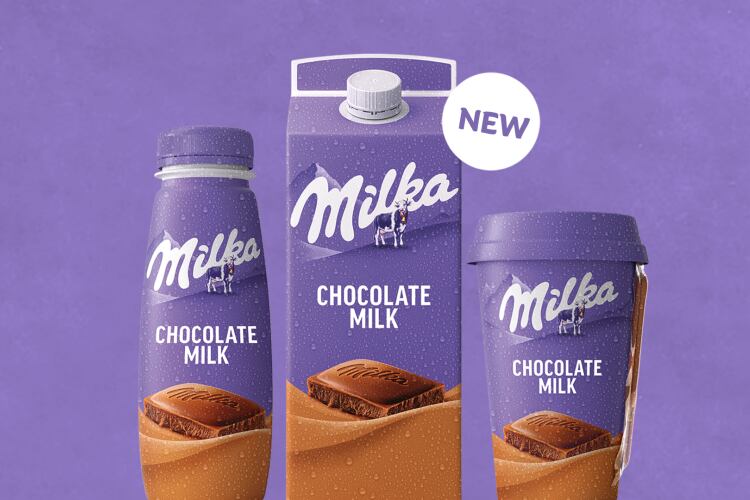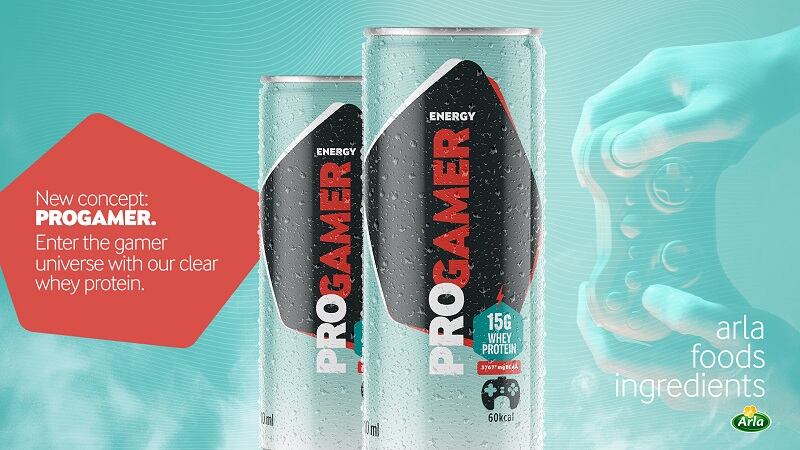As part of the deal, Arla Foods has obtained a licensing agreement to produce, distribute and market Milka-branded chocolate milk in Germany, Austria and Poland from June 2024.
Milka, a Swiss chocolate brand synonymous with its purple packaging and purple-spotted Alpine dairy cow, is one of the most recognizable chocolate brands in the three European markets. Mondelēz International has licenced the brand to be used in ice cream, cakes, bakery items and now, dairy beverages.
Christian Fischer, senior vice-president for Milk Based Beverages at Arla Foods, told us the new product line would primarily target ‘chocolate lovers and consumers who appreciate the combination of indulgent flavors with the goodness of milk’. Available in three flavors – Original Chocolate, Caramel and Noisette – the products will be sold through various distribution channels including retail stores and foodservice establishments, in formats including a 220ml cup, 250ml PET bottle, and 750ml aseptic carton.
Why are companies forging brand collaborations?
When brands collaborate, they tap into each other’s strengths and customer bases all while increasing consumer trust thanks to the presence of a recognizable brand name on-pack.
Asked how crucial brand collaborations are for driving consumer demand in the food and beverage space, Fischer said: “In a fast-paced category with expectations for novelty and unique positioning, branded collaborations in the food and beverage space have proven to be successful in driving consumer demand.
“By combining the strengths and recognition of two established FMCG companies, such partnerships create a unique and enticing proposition for consumers. They offer a sense of innovation, novelty, and excitement, which ultimately appeals to consumers and drives demand.”
He added that branded partnerships appeal to shoppers for a number of reasons. “Firstly, they provide an opportunity for brands to leverage each other's strengths and expertise, resulting in high-quality products that meet consumer expectations. Secondly, collaborations often introduce new and innovative flavors or product variations that consumers find intriguing.
“Lastly, brand partnerships create new opportunities for well-known consumer brands, which can enhance the desirability of the products among consumers.”
Snacks and sweets brands are well-positioned to fill that role, Fischer explained.
“Confectionery brands hold a strong appeal in food and beverage collaborations due to their popularity and recognition among consumers,” he said. “Shoppers are often attracted to products that feature a recognizable confectionery brand because it adds a sense of familiarity and trust.
“The combination of a beloved confectionery brand with a different product category, such as chocolate milk, offers a unique flavor experience that can be enticing to consumers.”
Why Europe, and why chocolate milk?
While Arla Foods already markets a range of own-brand chocolate milk products globally, from a high-protein dairy beverage to organic chocolate milk, this is the first time that the dairy co-op has committed to partnering with a major confectionery brand.

However, Arla has a multi-year strategic partnership with coffeehouse chain Starbucks, in which the dairy co-op is also a license partner that produces, distributes and markets dairy-based ready-to-drink coffee beverages across EMEA.
According to the co-operative’s annual report, the Starbucks-branded portfolio delivered 15.7% volume growth in 2023, with a revenue increase of 13.7%. The volume growth was mainly driven by Europe, where growth reached 21.8%, compared to 5.8% elsewhere. This suggests a particularly strong growth potential for branded RTD dairy beverages on the European continent.
According to Arla Foods executive vice-president and chief marketing officer Patrik Hansson, Arla Foods is hoping to achieve number 1 or 2 positions in the three launch markets with the Milka chocolate milk range. Brand recognition and consumer demand would therefore be important factors.
As for why the co-op has opted for a dairy beverage in this brand collaboration, we asked Fischer to put himself in the consumers’ shoes: why would anyone pick chocolate-flavored dairy milk over a chocolate bar?
“Consumers may choose chocolate milk over a chocolate bar for several reasons,” he explained.
“Firstly, chocolate milk offers a different form of indulgence and a refreshing beverage option. “It provides a unique combination of the rich taste of chocolate with the nutritional benefits of milk.”
With the product line launching in the summer, ‘Seasonality can play a role’, Fischer admitted. “Chocolate milk is often associated with hot weather and can be enjoyed as a cooling treat. Other factors include convenience, versatility, and the desire for a satisfying and nourishing drink.”
From a childhood treat to a post-workout pick-me-up
While chocolate milk has long been associated with childhood indulgence, the category has evolved in recent years to include premium, high-protein, and low-sugar products aimed at adults. Demand for higher quality, nutritional RTD products as well as raising awareness of the risk of chronic disease development from consuming large amounts of foods high in fat, sugar and salt are some of the driving factors behind these beverage trends.
Meanwhile, chocolate milk has been shown to improve milk consumption in US schools. This spring, a pilot led by the US dairy checkoff in Cincinnati schools found that offering lactose-free chocolate milk increased consumption and reached students who weren’t drinking milk because of real or perceived lactose intolerance.
But while chocolate milk provides the same essential nutrients contained in plain dairy milk, the former may contain added sugars and a higher amount of calories.
However, food and beverage producers have turned this high-calorie aspect of chocolate milk into a feature - for example by positioning such products as post-exercise drinks. Arla’s own high-protein range, which focuses on low-sugar and low-fat offerings, includes a 25g protein chocolate-flavored milk drink. The entire Protein portfolio yielded more than 60% volume growth in 2023, making it one of the most successful offerings from the co-op.
The Milka-branded chocolate milk will target the general consumer, as Fischer indicated. “The target market for Milka chocolate milk would primarily be chocolate lovers and consumers who appreciate the combination of indulgent flavors with the goodness of milk,” he said.
“The product will be available through various channels, including retail stores and potentially foodservice establishments. The aim is to make Milka chocolate milk easily accessible to consumers in the most convenient and popular distribution channels.”
Asked about the new range's nutritional value including sugar content, a spokesperson for the co-op provided the following response: "We believe there is room for indulgent products in a healthy balanced diet. We ambitiously strive for 90% of our sweetened portfolio has added sugar below 6g per 100g product. We succeeded on this in the Milka products that has 5g added sugar per 100g product."
Asked if the range will be a limited-edition offering, Fischer said: "It is not planned as a limited edition product, but rather as a permanent offering, which is seen as the starting point in a long-term partnership between Arla and Mondelēz.
"As Milka is also a beloved brand in many other European markets, we are constantly evaluating opportunities and will consider to further expand our partnership in the future."



